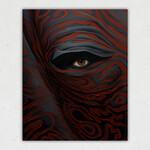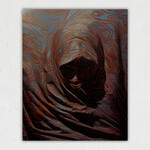Children of Father Romulus Print
by L. R. Ripley
About The Artwork
Cut off from civilization, deep in the heart of the jungle, Father Romulus ruled over his self-made kingdom with the air of a demigod. The—don't call it a cult—leader, was a figure of uncanny charisma and influence, surrounded by multiple children with an unsettling resemblance. Each is a living testament to his magnetic allure. The "Chosen One" series explores the many faces of control, manipulation, and consent.
It is said that Romulus was born into a military family where discipline and loyalty were valued above all else. A prodigious child, he was enrolled in the military academy at a young age and quickly climbed the ranks. His academic achievements and tactical skills were unmatchable, but his obsession with psychological warfare and esoteric philosophies set him apart from his peers.
As a young officer, he was deployed to remote, conflict-ridden areas. What he found there was both astonishing and horrifying—places where the boundaries of human morality seemed to blur. He became increasingly disillusioned with the bureaucracy and what he saw as the hypocrisy of the system he had served so faithfully.
Around this time, Romulus stumbled upon a ancient text that spoke of a lost civilization that had mastered the art of manipulating human emotion and perception. He became obsessed, spending years studying the text and applying its principles. Slowly, he started gathering followers—locals at first, who were drawn to his enigmatic presence and otherworldly wisdom. Over time, his following grew, fueled by rumors that Romulus had discovered the secrets to eternal life and ultimate power.
As his following expanded, so did the rumors. It was said that he had fathered more than one hundred children, each raised to be a fierce disciple and practitioner of Romulus' philosophies. People whispered that they were being groomed to become an army—an army that would establish a new world order based on Romulus' ideals.
The figure of the cult leader and his children raises uncomfortable questions about agency and victimhood.
It lays bare the unsettling notion that each of us, through our inherent vulnerabilities and the intricate circumstances of our lives, is capable of succumbing to the lure of false prophets promising easy answers. In a society grappling with the influence of movements like #MeToo and amid a rising tide of collective introspection, the artwork serves as a stark reminder that the interplay between free will and coercion remains a labyrinthine moral quandary, one that we are all still navigating.
Read More
It is said that Romulus was born into a military family where discipline and loyalty were valued above all else. A prodigious child, he was enrolled in the military academy at a young age and quickly climbed the ranks. His academic achievements and tactical skills were unmatchable, but his obsession with psychological warfare and esoteric philosophies set him apart from his peers.
As a young officer, he was deployed to remote, conflict-ridden areas. What he found there was both astonishing and horrifying—places where the boundaries of human morality seemed to blur. He became increasingly disillusioned with the bureaucracy and what he saw as the hypocrisy of the system he had served so faithfully.
Around this time, Romulus stumbled upon a ancient text that spoke of a lost civilization that had mastered the art of manipulating human emotion and perception. He became obsessed, spending years studying the text and applying its principles. Slowly, he started gathering followers—locals at first, who were drawn to his enigmatic presence and otherworldly wisdom. Over time, his following grew, fueled by rumors that Romulus had discovered the secrets to eternal life and ultimate power.
As his following expanded, so did the rumors. It was said that he had fathered more than one hundred children, each raised to be a fierce disciple and practitioner of Romulus' philosophies. People whispered that they were being groomed to become an army—an army that would establish a new world order based on Romulus' ideals.
The figure of the cult leader and his children raises uncomfortable questions about agency and victimhood.
It lays bare the unsettling notion that each of us, through our inherent vulnerabilities and the intricate circumstances of our lives, is capable of succumbing to the lure of false prophets promising easy answers. In a society grappling with the influence of movements like #MeToo and amid a rising tide of collective introspection, the artwork serves as a stark reminder that the interplay between free will and coercion remains a labyrinthine moral quandary, one that we are all still navigating.
Read More
The Serious Stuff
This print is part of our print-to-order selection. This approach minimizes waste of paper and ink, thereby contributing to a more eco-friendly world. Our prints offer a fusion of high-quality reproduction and archival-quality materials that ensure durability and resistance to fading. Simply frame and hang your print to elevate any room instantly.
SHIPPING: Items are made to order and typically ship within 3-4 business days. RETURNS: Return requests can be made within 30 days of your item(s) delivery.












